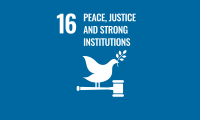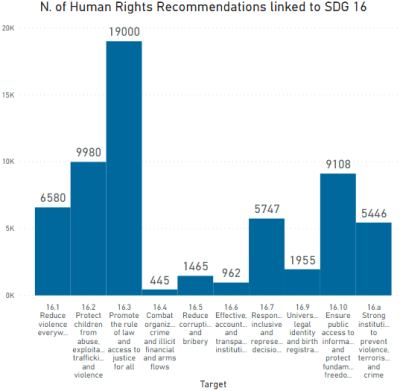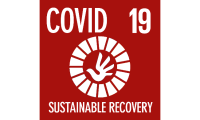SDG 16 and Sustainable Recovery

Key aspects of SDG 16:
1. Develop effective, accountable and transparent institutions, and ensure responsive, inclusive participatory and representative decision-making (16.6, 16.7)
The COVID-19 pandemic is challenging public institutions at all levels. Governments and justice actors face daunting responsibilities as they design, implement, and enforce new and ever-evolving measures to curb the spread of infection.
Lockdowns have constrained delivery of public services, including water, electricity, education, healthcare, resulting in weakening of the social contract between governments and citizens and triggering popular protests. The further weakening of the social contract and decline in living standards have especially affected countries that were already struggling with securing services and good living standards for their populations, increasing the gap between low- , middle and high-income countries. It is estimated that corruption costs developing countries 1.26 trillion every year.
The increased centralization of power in the executive branch and the weakening of the legislature and judiciary increases corruption risks and erodes public trust in governance institutions.
Effective, accountable and transparent institutions are critical to ensuring that adequate safeguards are put in place to protect lives and secure at-risk communities while upholding fundamental freedoms and protecting human rights. Accountability is essential for (re-)building the social contract between governments and citizens, and transparency is key to ensuring trust in pandemic measures.
The COVID-19 pandemic has led to disruptions in democratic processes including elections, and sparked conflict, political polarization, and constitutional crisis.
The pandemic has negatively impacted groups already excluded from decision-making processes such as refugees and migrants.
Sustainable response and recovery measures:
Rather than delaying or interfering with democratic processes including elections, countries must take measures to ensure safe access to voting venues following WHO advice.
Transparency and accountability around the design and implementation of economic stimulus packages, as well as the public health reasoning/basis for imposed restrictions is key to maintaining or building trust in institutions and avoiding corruption.
States should create avenues for participation and feedback and reach out to those most at risk and those most likely to be excluded, including women, older persons and persons with disabilities, and ensure that they are engaged and able to participate in policymaking on an equal basis.
States and other stakeholders should ensure that existing channels of civil society participation at local, national and international level, are maintained – and possibly expanded – when shifting to remote meetings and videoconferencing in the COVID-19 context. They should explore channels for remote participation through secure, cost-effective and accessible online platforms, which can facilitate more systematic outreach to grassroots and civil society organizations.
Visit the documents and resources listed in the “Key Human Rights Guidance” below for more information.
Universal Declaration of Human Rights (UDHR), art. 21.1: Everyone has the right to take part in the government of his country, directly or through freely chosen representatives.
International Covenant on Civil and Political Rights (ICCPR), art. 25.a, 25.b, 25.c: Every citizen shall have the right and the opportunity, without any of the distinctions mentioned in article 2 and without unreasonable restrictions:
(a) To take part in the conduct of public affairs, directly or through freely chosen representatives; (b) To vote and to be elected at genuine periodic elections which shall be by universal and equal suffrage and shall be held by secret ballot, guaranteeing the free expression of the will of the electors; (c) To have access, on general terms of equality, to public service in his country.
Convention on the Elimination of All Forms of Discrimination against Women (CEDAW), art. 7.b, 7.c: States Parties shall take all appropriate measures to eliminate discrimination against women in the political and public life of the country and, in particular, shall ensure to women, on equal terms with men, the right:
(b) To participate in the formulation of government policy and the implementation thereof and to hold public office and perform all public functions at all levels of government; (c) To participate in non-governmental organizations and associations concerned with the public and political life of the country.
2. Promote rule of law and equal access to justice, information and protection of fundamental freedoms (16.3, 16.10)
Pandemic-related emergency orders, laws, regulations and directives are being enacted in haste across the world. In some instances, these measures have weakened the rule of law and led to human rights abuses by security forces and other actors.
Access to justice is threatened by the pandemic in various ways. The need for justice services has increased due, for example, to the increasing number of cases related to social protection payments, evictions, gender-based violence, police violence, disproportionate emergency measures etc. Delays in justice system procedures and closure of courts have impacted access to justice and extended pre-trial detentions. Restrictions on visits to prisons have, in some cases, limited access to legal counsel. Online court sessions pose a challenge to the most marginalized and poorest people without access to the appropriate technologies.
COVID-19 emergency measures have led to an unprecedented wave of restrictions on civic space and fundamental freedoms. International human rights law recognizes that in the context of officially proclaimed public emergencies – including public health emergencies, which threaten the lives of many citizens– restrictions on some rights can be justified. Those limitations need to comply with international standards, including with regard to proportionality, and must be of a temporary nature.
Some states have gone beyond justifiable restrictions, with negative consequences for civic space and human rights, while also creating additional barriers for already excluded groups. COVID-19 has boosted a trend in many countries of increased government restrictions that target civil society actors and limit their freedoms of mobility, assembly, association and expression.
Throughout 2020, 155 internet shutdowns in 29 countries worldwide were recorded by Access Now, including the longest internet shutdowns on record. These internet shutdowns have become more sophisticated, lasting longer, affecting more people, and targeting vulnerable groups. The internet shutdown cut off hundreds of millions from essential health information, education and work opportunities during the pandemic and contributed to limiting information about human rights violations and silencing protesters. The internet is an essential element in human rights enjoyment, in particular, the right to freedom of expression and the right to access information.
Sustainable response and recovery actions:
Emergency measures must be legal, proportionate, necessary and non-discriminatory and respond proportionately to immediate threats while protecting human rights and the rule of law.
Emergency powers should be used within the parameters provided by international human rights law, particularly the International Covenant on Civil and Political Rights (ICCPR), which acknowledges that states may need additional powers to address exceptional situations. Such powers should be time-bound and only exercised on a temporary basis with the aim of restoring a state of normalcy as soon as possible.
Any surveillance must be proportionate, lawful and necessary: surveillance measures should be the least intrusive means available to meet public health needs, and as such include clear sunset clauses. Individual surveillance, contact tracing and individual movement tracking should be tightly regulated, with data being used only as strictly necessary to address the public health emergency. Expanded monitoring efforts related to COVID-19 should not fall under the domain of national security and intelligence entities.
States should establish oversight bodies and empower national human rights institutions to monitor response and recovery measures to ensure they are consistent with human rights obligations.
Law enforcement operations, including when carried out during extraordinary measures or a state of emergency, should comply with relevant international norms and standards. States should take measures to prevent human rights violations and abuses associated with the state of emergency being perpetrated by state and non-state actors.
Any allegations of human rights violations, including abuse of power, arbitrary detention, and sexual and gender-based violence by law enforcement and military personnel, must be effectively and promptly investigated and perpetrators brought to justice. This is particularly important in light of the extensive powers granted to law enforcement and military personnel in many countries during the COVID-19 pandemic.
States should pay specific attention to the public health implications of overcrowding in places of detention and to the particular risks to detainees created by the COVID-19 emergency, in assessing appropriateness of detaining individuals.
Sustainable recovery requires countering disproportionate and unjust restrictions on space for civil society, and establishing a new social contract, based on human rights obligations, that rebuilds trust in democratic institutions by eliminating discrimination, promoting meaningful rights-holder participation in policy formulation, planning, implementation and monitoring, and enhancing accountability and protecting fundamental freedoms.
Sufficient information about emergency legislation and measures should be communicated swiftly and in an accessible manner in all official and including all other languages spoken in the country, so the public at large is aware of the new, legal rules and can conduct themselves accordingly.
Measures to regulate misinformation on COVID-19 should be crafted with care, as they may lead to censorship of unpopular or minority opinions.
Attention must be paid to ensuring the safety of journalists and whistle-blowers who raise legitimate concerns about COVID-19 responses.
Visit the documents and resources listed in the “Key Human Rights Guidance” below for more information.
Universal Declaration of Human Rights (UDHR), art. 19: Everyone has the right to freedom of opinion and expression; this right includes freedom to hold opinions without interference and to seek, receive and impart information and ideas through any media and regardless of frontiers.
International Covenant on Civil and Political Rights (ICCPR), art. 19.2: Everyone shall have the right to freedom of expression; this right shall include freedom to seek, receive and impart information and ideas of all kinds, regardless of frontiers, either orally, in writing or in print, in the form of art, or through any other media of his choice.
International Covenant on Civil and Political Rights (ICCPR), art. 21: The right of peaceful assembly shall be recognized. No restrictions may be placed on the exercise of this right other than those imposed in conformity with the law and which are necessary in a democratic society in the interests of national security or public safety, public order (ordre public), the protection of public health or morals or the protection of the rights and freedoms of others.
International Covenant on Civil and Political Rights (ICCPR), art. 22.1: Everyone shall have the right to freedom of association with others, including the right to form and join trade unions for the protection of his interests.
Universal Declaration of Human Rights (UDHR), art. 6: Everyone has the right to recognition everywhere as a person before the law.
International Covenant on Civil and Political Rights (ICCPR). art. 16: Everyone shall have the right to recognition everywhere as a person before the law.
Universal Declaration of Human Rights (UDHR), art. 7: All are equal before the law and are entitled without any discrimination to equal, protection of the law. All are entitled to equal protection against any discrimination in violation of this Declaration and against any incitement to such discrimination.
Universal Declaration of Human Rights (UDHR), art. 8: Everyone has the right to an effective remedy by the competent national tribunals for acts violating the fundamental rights granted him by the constitution or by law.
International Covenant on Civil and Political Rights (ICCPR), art. 2.3.a: Each State Party to the present Covenant undertakes: (a) To ensure that any person whose rights or freedoms as herein recognized are violated shall have an effective remedy, notwithstanding that the violation has been committed by persons acting in an official capacity.
Universal Declaration of Human Rights (UDHR), art. 10: Everyone is entitled in full equality to a fair and public hearing by an independent and impartial tribunal, in the determination of his rights and obligations and of any criminal charge against him.
International Covenant on Civil and Political Rights (ICCPR), 14.3.b (b) To have adequate time and facilities for the preparation of his defense and to communicate with counsel of his own choosing.
Key Human Rights Guidance
- Emergency measures and COVID-19, The Office of the High Commissioner for Human Rights (OHCHR), Guidance, 2020
- Civic space and COVID-19, The Office of the High Commissioner for Human Rights (OHCHR), Guidance, 2020
- Preventing and combating racial profiling by law enforcement officials, Committee on the Elimination of Racial Discrimination (CERD), General recommendation, No. 36 (CERD/C/GC/36), 2020
- Challenges for the justice system during the coronavirus emergency, Special Rapporteur on independence of judges and lawyers / Special Procedures, News, 2020
- Right of peaceful assembly, International Covenant on Civil and Political Rights (CCPR), General Comment, No. 37 (C/GC/37), 2020
- The impact and consequences of the COVID-19 pandemic on trafficked and exploited persons, Special Rapporteur on trafficking in persons, especially women and children / Special Procedures, COVID-19 Position paper, 2020
- Disease pandemics and the freedom of opinion and expression, Special Rapporteur on the promotion and protection of the right to freedom of opinion and expression / Special Procedures, 2020
-
COVID-19 and youth, United Nations Inter-Agency Network on youth development, Statement, 2020
-
Rule of Law and COVID-19, Policy Brief, International Development Law Organization, 2020
-
Violence against Children, Agenda for Action, Inter-Agency Working Group, Guidance, 2020

Explore all Recommendations from human rights monitoring mechanisms linked to SDG 16 by country

